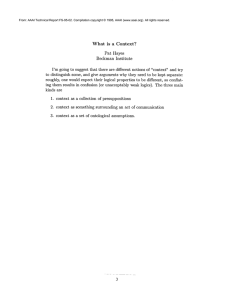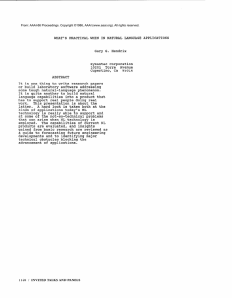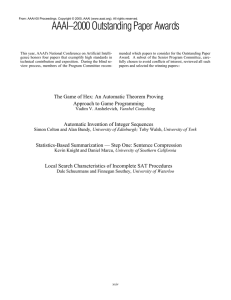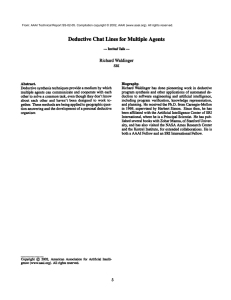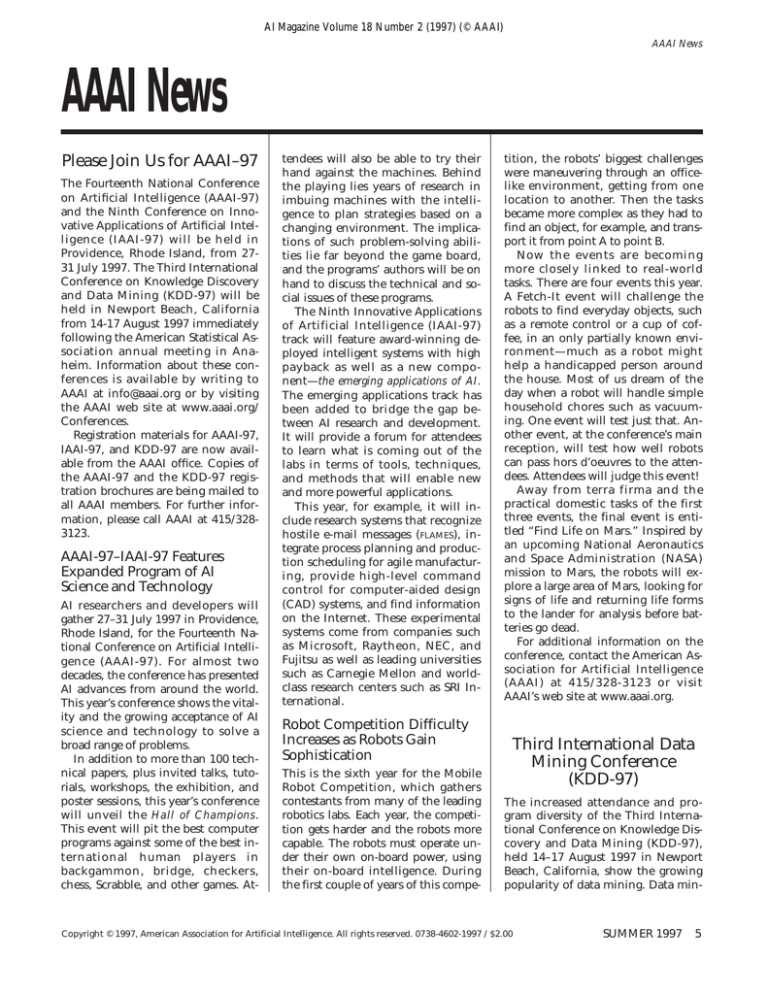
AI Magazine Volume 18 Number 2 (1997) (© AAAI)
AAAI News
AAAI News
Please Join Us for AAAI–97
The Fourteenth National Conference
on Artificial Intelligence (AAAI-97)
and the Ninth Conference on Innovative Applications of Artificial Intelligence (IAAI-97) will be held in
Providence, Rhode Island, from 2731 July 1997. The Third International
Conference on Knowledge Discovery
and Data Mining (KDD-97) will be
held in Newport Beach, California
from 14-17 August 1997 immediately
following the American Statistical Association annual meeting in Anaheim. Information about these conferences is available by writing to
AAAI at info@aaai.org or by visiting
the AAAI web site at www.aaai.org/
Conferences.
Registration materials for AAAI-97,
IAAI-97, and KDD-97 are now available from the AAAI office. Copies of
the AAAI-97 and the KDD-97 registration brochures are being mailed to
all AAAI members. For further information, please call AAAI at 415/3283123.
AAAI-97–IAAI-97 Features
Expanded Program of AI
Science and Technology
AI researchers and developers will
gather 27–31 July 1997 in Providence,
Rhode Island, for the Fourteenth National Conference on Artificial Intelligence (AAAI-97). For almost two
decades, the conference has presented
AI advances from around the world.
This year’s conference shows the vitality and the growing acceptance of AI
science and technology to solve a
broad range of problems.
In addition to more than 100 technical papers, plus invited talks, tutorials, workshops, the exhibition, and
poster sessions, this year’s conference
will unveil the Hall of Champions.
This event will pit the best computer
programs against some of the best international human players in
backgammon, bridge, checkers,
chess, Scrabble, and other games. At-
tendees will also be able to try their
hand against the machines. Behind
the playing lies years of research in
imbuing machines with the intelligence to plan strategies based on a
changing environment. The implications of such problem-solving abilities lie far beyond the game board,
and the programs’ authors will be on
hand to discuss the technical and social issues of these programs.
The Ninth Innovative Applications
of Artificial Intelligence (IAAI-97)
track will feature award-winning deployed intelligent systems with high
payback as well as a new component—the emerging applications of AI.
The emerging applications track has
been added to bridge the gap between AI research and development.
It will provide a forum for attendees
to learn what is coming out of the
labs in terms of tools, techniques,
and methods that will enable new
and more powerful applications.
This year, for example, it will include research systems that recognize
hostile e-mail messages (FLAMES), integrate process planning and production scheduling for agile manufacturing, provide high-level command
control for computer-aided design
(CAD) systems, and find information
on the Internet. These experimental
systems come from companies such
as Microsoft, Raytheon, NEC, and
Fujitsu as well as leading universities
such as Carnegie Mellon and worldclass research centers such as SRI International.
Robot Competition Difficulty
Increases as Robots Gain
Sophistication
This is the sixth year for the Mobile
Robot Competition, which gathers
contestants from many of the leading
robotics labs. Each year, the competition gets harder and the robots more
capable. The robots must operate under their own on-board power, using
their on-board intelligence. During
the first couple of years of this compe-
tition, the robots’ biggest challenges
were maneuvering through an officelike environment, getting from one
location to another. Then the tasks
became more complex as they had to
find an object, for example, and transport it from point A to point B.
Now the events are becoming
more closely linked to real-world
tasks. There are four events this year.
A Fetch-It event will challenge the
robots to find everyday objects, such
as a remote control or a cup of coffee, in an only partially known environment—much as a robot might
help a handicapped person around
the house. Most of us dream of the
day when a robot will handle simple
household chores such as vacuuming. One event will test just that. Another event, at the conference’s main
reception, will test how well robots
can pass hors d’oeuvres to the attendees. Attendees will judge this event!
Away from terra firma and the
practical domestic tasks of the first
three events, the final event is entitled “Find Life on Mars.” Inspired by
an upcoming National Aeronautics
and Space Administration (NASA)
mission to Mars, the robots will explore a large area of Mars, looking for
signs of life and returning life forms
to the lander for analysis before batteries go dead.
For additional information on the
conference, contact the American Association for Artificial Intelligence
(AAAI) at 415/328-3123 or visit
AAAI’s web site at www.aaai.org.
Third International Data
Mining Conference
(KDD-97)
The increased attendance and program diversity of the Third International Conference on Knowledge Discovery and Data Mining (KDD-97),
held 14–17 August 1997 in Newport
Beach, California, show the growing
popularity of data mining. Data min-
Copyright © 1997, American Association for Artificial Intelligence. All rights reserved. 0738-4602-1997 / $2.00
SUMMER 1997
5
AAAI News
ing encompasses a variety of computer approaches to garnering the
nuggets of knowledge from the growing gigabytes and terabytes of data
being stored in computers. The demand for such techniques is growing
as the need for making use of vast
repositories of data in an acceptable
timeframe increases. Data mining is
gaining attention in industry, government and scientific organizations
worldwide. There are a growing number of deployed KDD applications in
sectors such as finance, marketing insurance, health care, and astronomy.
In previous years, the KDD conference has been held concurrently with
the National Conference on Artificial
Intelligence. This year, in an effort to
foster cross-fertilization between KDD
and statistical techniques for data
mining, KDD will be held immediately following the Joint Statistical Meetings (JSM’97) in Newport Beach, California. For further information and
registration, contact the American Association for Artificial Intelligence
(AAAI) at 415/328-3123 or visit
AAAI’s web site at www.aaai.org.
KDD Leaders Organize the
Conference
KDD is the concern of many leading
industrial and academic researchers
around the world. This year’s organizing committee includes KDD researchers and developers from leading companies such as General
Motors, Microsoft, AT&T, GTE, Silicon Graphics, Boeing, and IBM as
well as leading universities from the
United States, Canada, Finland, Israel, Germany, The Netherlands, and
Hong Kong. Together, they have
pooled their knowledge to offer a
program that spans the breadth and
depth of advances in KDD.
The keynote speaker, Peter Huber,
from Bayreuth University in Germany, will explore what the statistics
and AI communities can learn from
one another as they both tackle the
problems of data mining. Until now,
the two communities have worked independently and differently; so, Huber examines what each can learn
from the other if they but looked over
the fence.
The conference will include a rich
6
AI MAGAZINE
array of tutorials, workshops, papers,
and product demonstrations of various approaches, algorithms, and applications of advanced KDD techniques.
AAAI-97 and KDD-97
Registration
Registration materials for the Fourteenth National Conference on Artificial Intelligence (AAAI-97) and the
Ninth Innovative Applications of Artificial Intelligence Conference (IAAI97), as well as the Third International
Conference on Knowledge Discovery
and Data Mining (KDD-97), are available from the American Association
for Artificial Intelligence (AAAI) at
ncai@aaai.org or on the AAAI web
site (www.aaai.org). For further information, please call AAAI at 415/3283123. The late registration deadline
for AAAI-97–IAAI-97 is 25 June 1997.
The late registration deadline for
KDD-97 is 15 July 1997.
AAAI Annual Business
Meeting
The annual business meeting of the
American Association for Artificial Intelligence (AAAI) will be held at 11:45
am, Thursday, 31 July 1997, in the
Westin Hotel, Providence, Rhode Island. Please remember to return your
AAAI ballot to the AAAI office no later than 13 June 1997.
To submit a candidate’s names for
consideration, please send the individual’s name, address, telephone
number, and e-mail address to Carol
Hamilton, Executive Director, AAAI,
445 Burgess Drive, Menlo Park, CA
94025; by fax to 415/321-4457; or by
e-mail to hamilton@aaai.org. Nominators should contact candidates prior to submitting their names to verify
that they are willing to serve, should
they be elected. The deadline for
nominations in 1 November 1997.
(Please note that the candidate name
submission deadline has shifted from
the spring to the fall to balance committee members’ time commitments.)
1997 AAAI Fall
Symposium Series
The 1997 American Association for
Artificial Intelligence (AAAI) Fall Symposium Series will be held Saturday to
Monday, 8-10 November, at the Massachusetts Institute of Technology in
Cambridge, Massachusetts. The topics
of the seven symposia will be:
■
■
■
■
■
AAAI Councilor
Nominations
Each year, the membership of the
American Association for Artificial Intelligence (AAAI) elects four new
councilors to serve three-year terms
on the AAAI Executive Council. The
Nominating Committee encourages
all regular members in good standing
to place an individual’s name before it
for consideration. The Nominating
Committe, in turn, will nominate
eight candidates for councilor. In addition to members’ recommendations,
the committee will actively recruit individuals to provide a balanced slate
of candidates. AAAI members will vote
in the spring of 1998.
■
■
Communicative Action in Humans
and Machines, David Traum (traum@
cs.umd.edu)
Context in Knowledge Representation and Natural Language, Sasa Buvac (buvac@cs.stanford.edu) and Lucja
Iwanska (lucja@cs.wayne.edu)
Frontiers in Soft Computing and Decision Systems, Larry R. Medsker
(medsker@american.edu)
ITS Authoring Tools, Carol Luckhardt
Redfield (carol@meitx.com)
Model-Directed Autonomous Systems, Brian Williams (williams@ ptolemy.arc.nasa.gov) and Pandurang Nayak
(nayak@ptolemy. arc.nasa.gov)
Reasoning with Diagrammatic Representations II, Michael Anderson (anderson@morpheus.hartford.edu)
Socially Intelligent Agents, Kerstin
Dautenhahn (kerstin@cyber.reading.ac.
uk) and Judith Masthoff
Symposia will be limited to 40 to
60 participants each. In addition to
invited participants, a limited number of other interested parties will be
able to register for each symposium
on a first-come, first-served basis.
Complete registration and hotel information will be available in July by
request from fss@aaai.org or on the
AAAI web site at www.aaai.org/Symposia/symposia.html. Invited partici-
AAAI News
pants must register by 15 September,
and the final registration deadline is
26 September. The headquarters hotel
for the AAAI Fall Symposium is the
Hyatt Regency, Cambridge. The deadline for hotel reservations is 7
October 1997. The discounted single
room rate of $139.00/night will not
be available after this date. Please call
the Hyatt at 617/492-1234 for reservations, and be sure to identify yourself as an attendee at the AAAI Fall
Symposium Series.
1998 Spring
Symposium Series
The 1998 Spring Symposium Series
will be held 23–25 March 1998 at
Stanford University. The Call for Participation will be available in July on
the American Association for Artificial Intelligence (AAAI) web site
(www.aaai.org/Symposia/symposia.ht
ml) and will be mailed to all AAAI
members.
AAAI-98
The American Association for Artificial Intelligence (AAAI) is pleased to
announce that the Fifteenth National
Conference on Artificial Intelligence
(AAAI-98) and the Tenth Innovative
Applications of Artificial Intelligence
Program (IAAI-98) will be held in
Madison, Wisconsin, from 26–30 July
1998. The AAAI-98 Call for Participation will be published this summer
and will be available on the AAAI
web site at www.aaai.org/Conferences/conferences.html. The program
cochairs for AAAI-98 are Jack
Mostow, Carnegie Mellon University
(mostow@cs.cmu.edu), and Charles
Rich, Mitsubishi Electric Research
Laboratory (rich@merl.com). For further information, please contact
AAAI by telephone at 415/328-3123
or by e-mail at ncai@aaai.org.
Please note that the Twentieth Annual Conference of the Cognitive Science Society will be held directly after
AAAI-98 and the Third Annual Genetic Progamming Conference (GP98) will be held just prior to AAAI-98,
both in Madison. Please watch for future updates on other collated conferences in 1998.
Congratulations to the
1997 AAAI Fellows!
Each year, a small number of fellows are recognized for their unusual distinction in the profession and for their sustained contributions to the field
for a decade or more. An official dinner and ceremony will be held in their
honor at the Fourteenth National Conference on Artificial Intelligence
(AAAI-97) in Providence, Rhode Island.
Henry A. Kautz
AT&T Laboratories—Research For contributions to
many areas of artificial intelligence, from plan recognition to knowledge representation to software
agents.
Pat Langley
Daimler-Benz Research and Technology Center
and Institute for the Study of Learning and Expertise For his cognitive models of numerous data-driven scientific discoveries and his founding role in the
emergence of machine learning.
Robert M. MacGregor
USC/Information Sciences Institute For contributions to knowledge representation and development
of the LOOM knowledge representation system.
David Allen McAllester
AT&T Laboratories—Research For contributions to
the fields of knowledge representation, reasoning,
search, and planning.
Stuart Russell
University of California at Berkeley For contributions to machine learning, bounded rationality, and
planning under uncertainty.
SUMMER 1997
7
Expertise in Context
Human and Machine
Edited by Paul J. Feltovich, Kenneth M. Ford, and Robert R. Hoffman
C
omputerized “expert systems”
are among the best known applications of artificial intelli-
gence. But what is expertise? The nature
of knowledge and expertise, and their
relation to context, is the focus of active
discussion—even controversy— among
psychologists, philosophers, computer
scientists, and other cognitive scientists.
The questions reach to the very foundations of cognitive theory—with new
perspectives contributed by the social
sciences. These debates about the status
and nature of expert knowledge are of
interest to and informed by the artificial
intelligence community—with new perspectives contributed by “constructivists” and “situationalists.”
The 23 essays in this volume discuss
the essential nature of expert knowledge,
as well as such questions such as how
“expertise” differs from mere “knowledge,” the relation between the individual and group processes involved in
knowledge in general and expertise in
particular, the social and other contexts
of expertise, how expertise can be assessed, and the relation between human
and computer expertise.
Cover illustration: “The Clown” by Max Papert. Reproduced with permission from
Nahan Galleries, New York, New York.
Published by the AAAI Press / The MIT Press
590 pp., $40.00 ISBN 0-262-56110-3 Prices higher outside the U.S. and subject to change without notice.
To order call 800-356-0343 (US and Canada) or (617) 625-8569.
Distributed by The MIT Press, 55 Hayward, Cambridge, MA 02142
8
AI MAGAZINE

